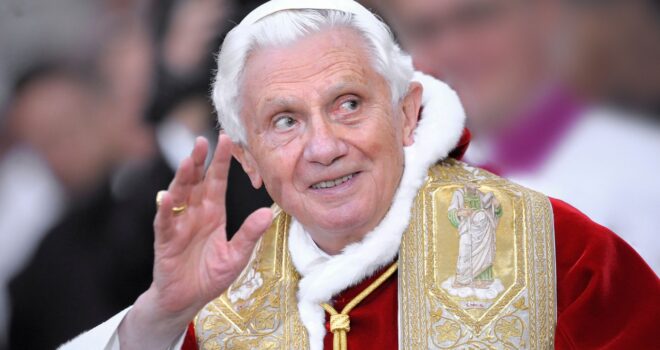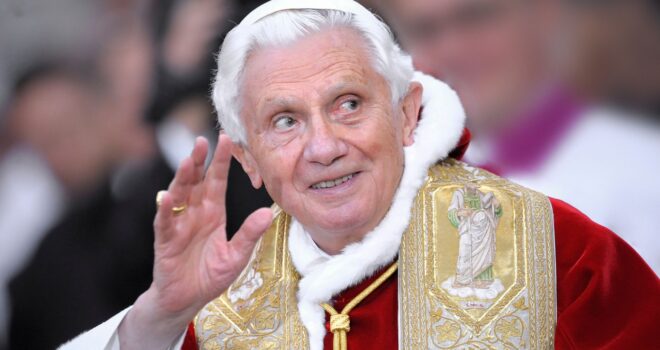If you want to learn about Benedict XVI’s theology, there is a wide range of books to choose from, many of which are over the head of the average reader. If you want to learn about Benedict the man, I recommend starting with Monsignor – now Archbishop – Alferd Xuereb’s diary, a refreshing glimpse into the more important side of the late Pope emeritus: a man who threw himself into the mundane details of a simple, disciplined life spent in service to the Lord and his Church.
Msgr. Xuereb – fondly known as “Don Alfred” – succeeded Msgr. Mieczysław Mokrzycki – fondly known as “Don Mietek” – as Benedict’s second “second” secretary, with Msgr. Gänswein – fondly known as “Don Giorgio” – being the first and only “first” (I know it’s a bit confusing). Although the Maltese prelate had previous experience working as Antechamber Prelate in the Pontifical Household under John Paul II, he did not have as deep a prior relationship with Ratzinger as Gānswein did. Nevertheless, Don Alfred’s pastoral experience in a Münster hospital gave him proficiency in German, not to mention his “courtesy and discretion” praised by Gänswein in his own memoir entitled, Who Believes is Not Alone.
In that book, Gänswein confesses that he was moved by something Monsignor Xuereb’s had noted after Benedict’s resignation: “What struck me most about Pope Benedict was that a few days after receiving a prayer request, he would ask me, ‘Have you heard from Mr. or Mrs. So-and-So (he would always remember the last name) that you told me about?’ Sometimes, I would sadly have to tell him that the person died, and I was always struck by his reaction. The rest of us wouldn’t have given much thought to the matter after that, but Pope Benedict would always recite a prayer for that person – ‘Eternal rest, etc.’ – and then invite me to pray too. It wasn’t only his memory that was so impressive, but his presence. Even with a million things on his mind, he considered prayers for the sick, the dying, and the deceased to be an indispensable part of his pastoral ministry.”
This is the portrait Xuereb wants to paint. The Pontiff’s unfailing mindfulness of others had an enormous effect on Don Alfred, especially when it came to the pope’s constant concern for his own “family”: Mosnignors Gänswein and Xuereb, and the four members of the Memores community, one of whom – Manuela Camagni – tragically died after having been struck by a vehicle in Rome, leaving a deep wound in Benedict’s heart.
Benedict XVI was bent on fostering a community that would help him in his Petrine ministry and, in Don Alfred’s words, create a school of “formation” that would help all of them grow in charity. “We who live here should not be happy solely because we are living so close to the Vicar of Christ,” Xuereb writes, “but even more because living with him is like attending a school of character formation … his example and words help us to maintain among ourselves a high level of charity and fraternity. Indeed, living with the pope makes us understand that there is never a need to fall into futile talk or act outside the boundaries of charity” (p. 25).
Examples of his charity abound. Benedict always asked specific questions about Don Alfred’s relatives, going out of his way to invite his mother to the papal residence for a meal whenever she was in town. As pope, he personally met with a certain Mrs. Clelia Moneta and her children, whom he helped retain an apartment in the Vatican after the death of the husband and father of the family, Alfredo, who had been a porter at the Congregation for the Doctrine of the Faith. Ratzinger also maintained a close friendship with the Crescenti family, whom he had known for over forty years. In short, he had an unparalleled “capacity to keep relationships of friendship alive,” even amidst a busy schedule (29). A frequent guest in the pontifical household was Benedict’s priest brother, Msgr. Georg, with whom Benedict maintained a separate, private telephone line.
Benedict’s solicitous care inspired Monsignor Xuereb to keep in constant communication with his own family and friends after assuming his new duties as papal secretary. He remembers them by name at every Mass he celebrates with the Holy Father. He gladly offers Mass for the Association of Saints Peter and Paul, of which had been chaplain. The pages of his diary reveal a simplicity no less notable that Benedict’s, making him a perfect fit for the job. Xuereb constantly describes Benedict in paternal terms that become even more poignant after the death of his biological father in October of 2008. As Fr. Federico Lombardi, S.J., writes in the book’s Preface, the “little things” are more important than the “big things” when it comes to understanding Benedict XVI. Lombardi rightly notes that the first-year entries in Xuereb’s diary are the most important, even though readers will want to flip to the final entries hoping to discover the previously unrevealed truth about Benedict’s resignation.
Perhaps nothing indicates Benedict’s simplicity more than his love for cats, even though he never owned one as pope. That did not stop him from making comments to a stuffed cat in the papal apartment whenever he passed by. He was quite fond of the children’s book Joseph and Chico, a gift he received from the author, Jeanne Perego. He even had thought of writing a book himself about cats. “The irony of fate!” he once remarked to Don Alfred. “Instead of me speaking about cats, it is the neighbor’s cat that speaks about me!” (30).
One of the rituals most dear to Don Alfred was feeding the fish with Benedict after their rosary walks together at Castel Gandolfo. Indeed, the grotto of “Our Lady of the Fish” became a place where Don Alfred deepened his filial love for Benedict and listened attentively to whatever words of wisdom the pope would offer seated next to him on the bench.
Xuereb rightly draws attention to Benedict’s remarkable sense of humor, a quality completely missed by Netflix’s The Two Popes. The pope loved to be amused, such as when, during an audience with the Pontifical Council Cor Unum, he lent Cardinal Paul Josef Cordes his eyeglasses so that the Cardinal could read the Council’s greeting to the pope, only to ask for them back when it was his turn to read a welcome to the Council. Benedict was so tickled by the affair that he couldn’t wait to tell the Memores over lunch.
Benedict’s penchant for precision led him to ask for Xuereb’s help in correctly pronouncing the Maltese greeting for the Christmas Urbi et Orbi blessing. After Xuereb pronounced the line, Benedict remarked, “It seems to me that this greeting is very short.” Xuereb explained to him that the greeting in former years was longer, but it was shortened so that the pope could pronounce it more easily. Benedict, however, would not settle for the shorter, simplified greeting and asked that it be substituted with the longer, more formal greeting.
An even more striking example of Benedict’s humility occurred during a rosary walk when Don Alfred confessed that he never understood the following words from Psalm 121: “The sun shall not smite you by day, nor the moon by night.” The pope – one of the century’s greatest theologians – replied, “I, too, do not know the exact meaning of those words.” Similarly, Benedict went out of his way to correct himself after incorrectly asserting that – contrary to Don Alfred’s conviction – the Greek text of chapter 28 of the Act of the Apostles makes no mention of Malta (59). Having consulted the Greek text before dinner, Benedict unabashedly corrected himself and apologized to Don Alfred.
Xuereb is also deeply impressed by the way Benedict deals with the mistakes of others, including Xuereb’s own. He “always shows his good-heartedness in not mortifying anyone on those occasions when someone seeks pardon for some unintentional mishap. On the contrary, he always finds a way to provide us with an excuse by using such a phrase as ‘All right, but it was only for a very short time!’ It’s a way of saying, for instance, ‘It is true that you forgot to remove the zucchetto, but it lasted for a short time because you fixed the oversight!’” (78).
Xuereb shares this touching example:
“One afternoon, the pope, as usual, was in his study at a time when I happened to be alone in the secretariat. At one point the porter called me to say that a priest, visiting Rome, had missed his return flight home and was asking for my assistance. I went down to the concierge to see how the matter could be resolved. At that very moment, Pope Benedict, in a manner altogether out of character, left his office and, if my memory serves me well, went to look for a pencil. When I returned upstairs, I felt mortified that the pope had not found me in my office, and I apologized as soon as I met him later for the Rosary. That evening, before going to bed, I was in the process of repeating my apology when he interrupted me and said something like ‘There is no need to apologize again, for it has already been accepted and there is no further need to think about it.’ I learned a great lesson that I will keep in mind whenever someone tries to repeat an apology, so as to spare him further mortification” (78).
The diary contains extensive citations from Benedict’s speeches, homilies, and writings whenever they strike a spiritual chord with Don Alfred, especially on solemnities, at general audiences, and during concerts in the Paul VI Audience Hall.
Xuereb also draws attention to speeches and homilies he believes will go down in history as Benedict’s most important. The speech given to the members of the world of culture during an Apostolic Visit to France, for example, is arguably Benedict’s most brilliant. He offers a penetrating interpretation of European history and Christianity’s role in forming culture:
“Quaerere Deum — to seek God and to let oneself be found by him, that is today no less necessary than in former times. A purely positivistic culture which tried to drive the question concerning God into the subjective realm, as being unscientific, would be the capitulation of reason, the renunciation of its highest possibilities, and hence a disaster for humanity, with very grave consequences. What gave Europe’s culture its foundation — the search for God and the readiness to listen to him — remains today the basis of any genuine culture.”
Readers eager to discover Benedict’s opinions about other ecclesiastics will be disappointed. He did, however, seem to have a particular admiration for Cardinal Marc Ouellet, whom he asked to give a press conference about his volume Jesus of Nazareth, and whom Xuereb believed Benedict thought would make a good pope.
There are two ways of interpreting this book. It clearly bears out the striking simplicity of Benedict, Xuereb, and their daily life within the Pontifical Household. The reader may thus conclude that such a life is insular, detached from the grittiness of the world, and lacking any real contact with the concerns of the suffering and the afflicted, or with those working hard just to put food on the table for their children.
But that would be a wrong interpretation. Rather, the monotonous, disciplined simplicity of Benedict’s daily routine freed him and his “family” to think only about the needs of others, to pray for them, and to think deeply about how to witness Christ’s Gospel in a world desperately in need of it. If charity starts at home, then it made perfect sense for Benedict to cultivate a household of genuine koinonia above all else.
Although Xuereb includes reflections on Vatileaks, the Bishop Williamson affair, press coverage of the pope’s comments on prophylactics, and Benedict’s resignation, they contain no startling revelations. Indeed, his comments will only serve to shame outlandish, hysterical conspiracy theories about Vatican secrecy and cover-ups. With regard to Vatileaks, Xuereb points out that Benedict was so distressed by Paolo Gabriele’s betrayal that he could not sleep. “(Benedict) never voices words of blame or condemnation (toward Gabriele),” Xuereb writes. “Rather, he speaks like a father who cannot understand his son. He remarked (once to Xuereb), ‘But did he ever think of his family and the pain he would bring to his wife and children?’” (286).
As for Benedict’s theology, Xuereb provides a valuable insight, pointing out how strongly Fr. Raniero Cantalamessa’s description of a “third search” for Jesus resonated with Benedict’s Christological vision. The third search is distinguished from the “‘old search,’ which was inspired by the rationalists and liberals of the eighteenth and nineteenth centuries, as well as from the ‘new historical search,’ which, around the middle of this last century, declared the historical Jesus to be unattainable and irrelevant to the Christian faith. These are themes well known by Professor Joseph Ratzinger, who discusses them with great passion, as demonstrated in his books on Jesus” (37).
On 23 October 2011, Xuereb notes that the pope has begun to pray longer in the sacristy before Mass. He repeats this observation on 10 November 2011. After returning from summer vacation in August of 2012, Xuereb notices that pope’s face is paler and more hallow. He writes on 13 September 2012 that the pope’s balance is noticeably less sure. Yet he is still understandably shocked when Benedict informs him on 5 February 2013 that he intends to resign:
“Today’s date will remain imprinted in my memory and in my heart for the rest of my life. The Holy Father calls me to his office this morning. He asks me to make myself comfortable and says he has something important to tell me. Immediately afterward, in fact straightaway, he tells me the shocking news: he has decided to abdicate the papacy! … ‘I am going to take up residence at the former cloistered monastery in the Vatican Gardens … but you, monsignor, will remain with the new pope.’ … I am rendered speechless, but I understand that Benedict has already thought of everything. His decision is very painful to me, and now I understand the precise reason why he has spent such a long time in prayer. The pope reflects for a long time and relies fully on the Lord. When he makes a decision, he certainly does not go back on it” (316).
Xuereb recounts with a tinge of regret how rapidly he had to assume his new duties as Francis’s personal secretary, for it seemed it never allowed him to bring his service to Benedict to a fitting conclusion. Yet such is the life of one who serves as humbly and loyally as Xuereb does.
Pope Francis appointed him titular Archbishop of Amantea and Apostolic Nuncio in South Korea and Mongolia, a clear sign of the present Pontiff’s trust in him. His episcopal motto, Ut Unum Sint, harks back to where it all began under John Paul II in the Prefecture of the Papal Household during the Great Jubilee. At a young sixty-four, Archbishop Xuereb still has years of service ahead of him, making one wonder whether he might well be consulted someday to testify to Benedict XVI’s heroic virtue. If so, no one could more fittingly express how, when it comes to the Christian faith, such heroic virtue only emerges in the simple, mundane, boring details of a seemingly un-heroic life – a life like Joseph Ratzinger’s.
Image: AP
My Days with Benedict XVI is available from Sophia Institute Press.














